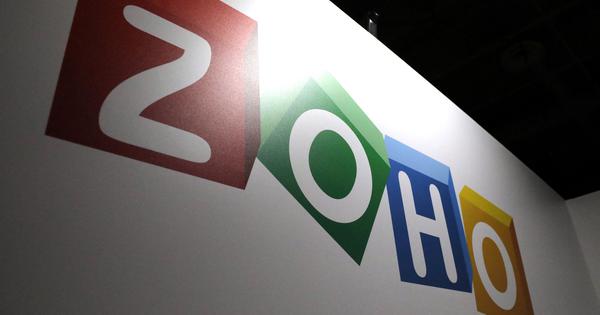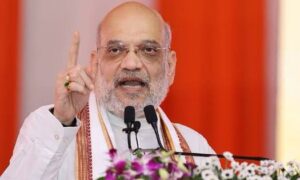
About 12 lakh email addresses of Union government employees have over the past year migrated from the systems of the National Informatics Centre – the government’s information technology department – to a platform owned by private technology firm Zoho.
Union Minister Amit Shah also said that he will switch to using a Zoho email address for his work related to the Bharatiya Janata Party. Other party leaders joined in.
This confirmation came days after the Union education ministry on October 3 issued an order prodding officials to use Zoho Suite, a productivity applications platform such as Microsoft Office, citing the government’s “pursuit of building a self-reliant ecosystem in technology”.
The circular said that by embracing Zoho’s indigenous tools, “we take a bold step in the Swadeshi movement…and secure our data for a self-reliant future”.
Union Information Technology Minister Ashwini Vaishnaw had in September said on social media that Zoho Office Suite’s capabilities were “phenomenal” and that he will start using the product at the earliest.
An unidentified official told The Hindu that the suite was activated to ensure that employees do not use open source applications to create word documents and spreadsheets. The suite was already available but not many employees were using it, the official said.
The migration of government email addresses to the systems of a private entity was questioned by critics on social media.
In response, Sridhar Vembu, the founder of Zoho, said that the National Informatics Centre had chosen the Chennai-based firm as part of a 2023 tender process and following security audits.
Zoho said that the office suite mentioned in the circular was part of the same process.
S Krishnan, the information technology secretary, told Moneycontrol that the government’s “wider push will be for Indian products” and that “it’s not fair to single out a single company and say we are pushing this”.
But this did not explain why senior Union ministers are also endorsing the use of another Zoho product Arattai. The messaging platform is to compete with Western apps such as WhatsApp.
In 2020, the government had similarly endorsed Koo, a rival to Twitter. The platform shut down in 2024.
These endorsements have been projected as support for Swadeshi, or Made in India, products to boost “atmanirbharta” (self-reliance) and strengthen “digital sovereignty”.
But critics point out that it is not for the government to recommend individual companies. Asking people to adopt products of Indian companies was one thing, naming one firm specifically was another, one said on social media.
Kazim Rizvi, the founding director of public policy think tank The Dialogue, told Scroll that while encouraging local solutions is commendable, it is important to ensure “existing inclusive approaches that support multiple entities of Indian origin”.
Some alluded to Vembu being close to the government. He was involved in the Rashtriya Swayamsevak Sangh-affiliated Swadeshi Jagran Manch – a platform on economic matters – and was appointed to the National Security Advisory Board in 2021. The RSS is the parent organisation of the ruling BJP.
The concerns
There are broader concerns about Zoho hosting government emails.
Opposition MP John Brittas said that Parliament email addresses used by legislators to share sensitive documents would also be “handed over” to the Zoho system.
“When such communications are routed through privately controlled back-end operations and an authentication system operated by a private firm, the independence of the Legislature stands, at the very least, exposed to risk of compromise,” he said.
When a social media user asked Vembu who at Zoho would have access to intimate pictures exchanged between a husband and wife, the 57-year-old said: “Our entire SAS business is based on the trust that we DO NOT access customer data and we do not use it for selling stuff to them.”
“The data is stored in encrypted disk storage like a cloud service,” he added in another post. “No employee has access to it. When end to end encryption is rolled out, that cloud storage will be removed. It will only be there on the device.”
Apar Gupta, the founder director of digital rights organisation Internet Freedom Foundation, told Scroll that there are risks when a private vendor is chosen for a critical state function such as the email communications of the government.
Gupta said that email security would hinge less on the vendor’s brand and more on the contract, who controls the administration and compliance with the audit and security regime.
He said that NIC is the implementing agency under the government’s 2024 E-mail Policy and “only NIC-provided services” may be used for official communications. If Zoho operates as a backend provider under NIC’s tenancy and control, with the government entity owning aspects such as identities, logging and administration, “the model can be made compliant with the policy’s requirements”, Gupta added.
However, Gupta said that clarity was needed about how the email text data and the meta data will be stored by Zoho “pursuant to such audit processes”.
“Hence, greater transparency through the entire contract life cycle is necessary given this deployment is for the public sector,” Gupta said. “Transparency here means going beyond tweets and responses to the press to publishing where possible the contract, audit and compliance details through proactive disclosures.”
If Zoho was selected in the 2023 tender process, “the fairness question turns on how the tender was framed and evaluated”, according to Gupta.
As per the 2017 General Financial Rules and the 2024 Procurement Manual, “fairness requires brand neutral, performance based specs, wide competition and transparent evaluation”, he said.
“It also requires that Open Source Software be considered as the preferred option (per information technology ministry’s Open-Source Software policy) or that any exclusion be expressly justified,” he said. “As we have stated in our representation these appear to be absent.”
According to Gupta, the correct next step would be the proactive disclosure of the tender documents, technical scoring and audit commitments so that Zoho’s competitors and the public can see the playing field was level.
Here is a summary of last week’s top stories.
Up in smoke. The Supreme Court allowed the sale and lighting of green firecrackers in Delhi and the adjoining areas in the National Capital Region during Diwali. The bench allowed the sale between October 18 and October 21 in designated locations, and limited the use of firecrackers between 6 am to 7 am and 8 pm to 10 pm.
The court said that a total ban, which it had imposed in April, had proven counterproductive as it led to the smuggling of conventional firecrackers that caused far greater harm to air quality. “We have to take a balanced approach,” it added.
Green firecrackers are considered less polluting than regular ones as they are made with modified formulations and do not contain harmful elements such as lithium, arsenic, barium and lead.
Mercy Austin writes about why some Delhi residents leave the city during Diwali.
The Russian oil dilemma. The Ministry of External Affairs neither confirmed nor denied United States President Donald Trump’s claim that Prime Minister Narendra Modi has agreed to stop India’s purchase of Russian oil. The ministry said that discussions are underway about deepening energy cooperation between New Delhi and Washington.
New Delhi said that ensuring stable energy prices and secured supplies are the two goals of India’s energy policy. It also said that India has sought to expand energy procurement from the US for many years, and that this has steadily progressed in the past decade.
Trump has imposed punitive levies on India for importing Russian oil, repeatedly alleging that the purchases were helping fund Moscow’s war on Ukraine.
Congress leader Rahul Gandhi said that Trump’s statement indicated that Modi was “frightened” of the US president.
Attacker goes scot-free? The Supreme Court said that it would be better to let the attack on Chief Justice BR Gavai “die a natural death” rather than fuel its “monetisation” on social media. This came after the bench was told that Attorney General R Venkataramani had given his consent to initiate criminal contempt proceedings against advocate Rakesh Kishore, who allegedly attempted to throw a shoe at Gavai.
Although Supreme Court Bar Association President Vikas Singh urged the court to list the matter for Friday, it decided to take it up after the Diwali break.
The court also questioned if it was wise to intervene in the matter when the chief justice “has shown magnanimity”. Gavai had described the October 6 attack on him as a “forgotten chapter”.
Aniruddha Mahajan writes: Attack on CJI Gavai: How casteist assertion throws a shoe at fragile constitutional ideals
Also on Scroll last week
Follow the Scroll channel on WhatsApp for a curated selection of the news that matters throughout the day, and a round-up of major developments in India and around the world every evening. What you won’t get: spam.
And, if you haven’t already, sign up for our Daily Brief newsletter.
📰 Crime Today News is proudly sponsored by DRYFRUIT & CO – A Brand by eFabby Global LLC
Design & Developed by Yes Mom Hosting






